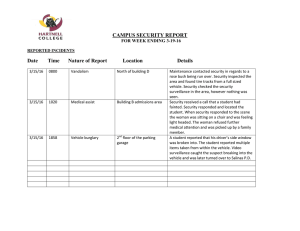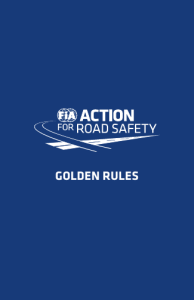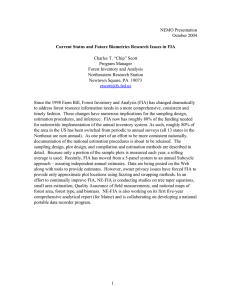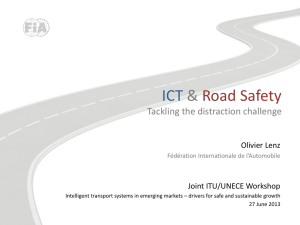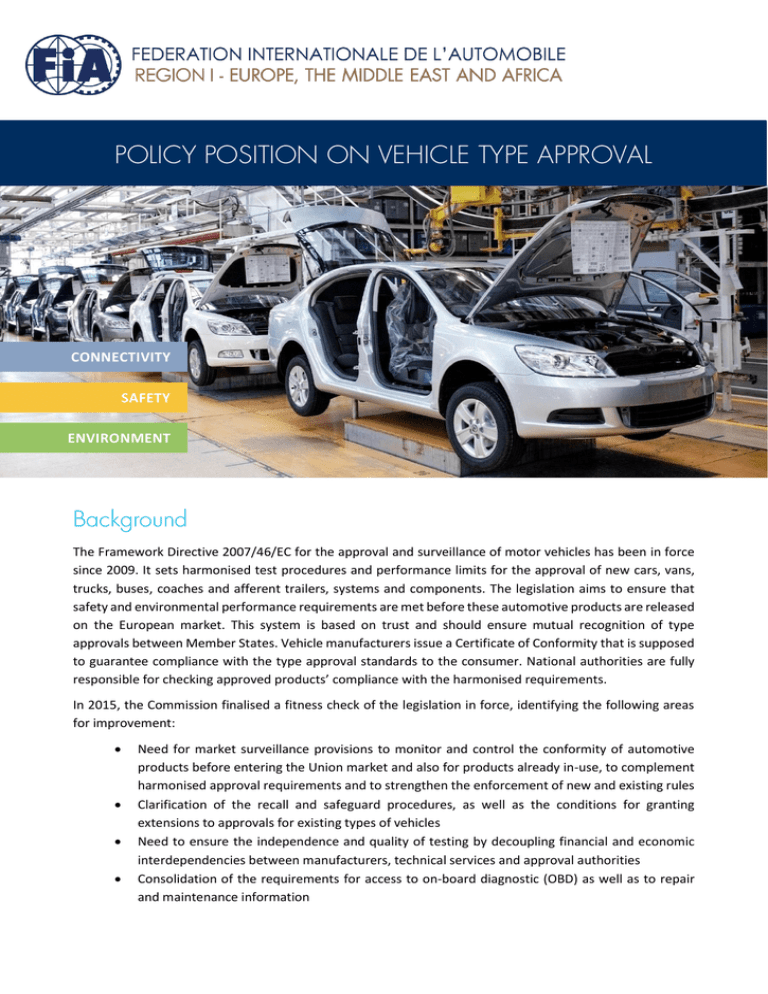
POLICY POSITION ON VEHICLE TYPE APPROVAL
CONNECTIVITY
SAFETY
ENVIRONMENT
Background
The Framework Directive 2007/46/EC for the approval and surveillance of motor vehicles has been in force
since 2009. It sets harmonised test procedures and performance limits for the approval of new cars, vans,
trucks, buses, coaches and afferent trailers, systems and components. The legislation aims to ensure that
safety and environmental performance requirements are met before these automotive products are released
on the European market. This system is based on trust and should ensure mutual recognition of type
approvals between Member States. Vehicle manufacturers issue a Certificate of Conformity that is supposed
to guarantee compliance with the type approval standards to the consumer. National authorities are fully
responsible for checking approved products’ compliance with the harmonised requirements.
In 2015, the Commission finalised a fitness check of the legislation in force, identifying the following areas
for improvement:
Need for market surveillance provisions to monitor and control the conformity of automotive
products before entering the Union market and also for products already in-use, to complement
harmonised approval requirements and to strengthen the enforcement of new and existing rules
Clarification of the recall and safeguard procedures, as well as the conditions for granting
extensions to approvals for existing types of vehicles
Need to ensure the independence and quality of testing by decoupling financial and economic
interdependencies between manufacturers, technical services and approval authorities
Consolidation of the requirements for access to on-board diagnostic (OBD) as well as to repair
and maintenance information
FIA Region I Position
FIA Region I and its affiliated Mobility Clubs welcome the Commission’s proposal. Especially because
consumers urgently need a sound revision process to ensure that they can trust the products put on the
European market and that they get a fair deal for maintenance and repair of their vehicle.
The proposal published on 27 January 2016 seeks to strengthen the governance of the approval system in
the aftermath of the Volkswagen crisis. More transparency and additional checks prior to and post-
commercialisation will provide a more reliable scheme for the detection of non-compliance.
The Forum for Exchange of Information on Enforcement should ensure greater consistency in European and
national measures as well as harmonise requirements and sanctions. Technical services’ independence
should be reinforced by cutting their commercial link with manufacturers. Procedures for EU-wide recalls of
non-compliant products posing a serious risk should be put in place to ensure a quick and coherent approach
across the EU. Finally, compliance should be incentivised through the introduction of administrative fines for
economic operators.
Improve type-approval governance and enforcement
The Commission proposal increases the EU oversight of type approval and market surveillance authorities,
which is a good step forward. From a consumer point of view, we welcome the improved provisions on
Member State penalties imposed on dysfunctional technical services or on economic operators infringing on
requirements as well as Commission’s administrative fines as a means to de-incentivise fraud and low quality
approvals;
In addition, FIA Region I calls on the following improvements to be made:
Articles 9 and 23, which foresee public access to data needed for compliance verification and access
to the software and algorithms of the vehicles, are welcomed. Granting access to independent
testing houses for verification purposes will strengthen the system by ensuring that additional tests
are performed and that consumers are better informed
Certain testing values, which are impossible for independent testers to replicate should be made
available directly through the EU type approval database without restrictions and free of charge to
accredited third party testers.
Data availability should be ensured with the shortest possible delays and the data must be made
available free of charge
Market surveillance
The Commission proposes to strengthen existing national market surveillance activities. Market surveillance
authorities are asked to perform “regular checks (…) on an adequate scale (…) on the basis of statistically
relevant samples”. In order to overcome the lack of resources, the proposal foresees the establishment of a
national fee structure, which would finance national and EU compliance verification and type approval
(Article 30).
2
FIA REGION I - RUE DE LA SCIENCE 41, 5TH FLOOR - B-1040 BRUSSELS, BELGIUM - +32 2 280 0758 - WWW.FIAREGION1.COM
FIA Region I welcomes the Commission’s involvement in market surveillance activities to reinforce
independent oversight and strengthen the internal market. Sufficient human and financial resources should
be allocated to this activity, both at the EU and national levels, with due attention being paid to resource
efficiency.
In addition, FIA Region I calls on the following:
At national level, bodies performing market surveillance activities should be fully independent
administratively, technically and financially, from the authority granting type approval
There should be regular physical checks and tests of vehicles, not only administrative / desk
verifications carried out by independent organisations, which do not compete in type approval
testing or market surveillance
Risk-based surveillance could be considered in order to enhance the efficiency of EU-wide
surveillance testing. Similar schemes have been implemented successfully for many years in some
Member States1
The national fees levied by Member States should not lead to extra costs for either consumers or tax
payers and the proposed structure should ensure an adequate level of verification for vehicles in use
in all Member States, regardless of whether or not type approvals are granted in this country
The Regulation should ensure that physical market surveillance measures are effective, efficient and
have a sound financing source allowing for full transparency
The electronic platform for information exchange should contain all relevant product information
from cradle to grave, and relevant information should be directly accessible for accredited, third
party surveillance testers without restrictions and free of charge
Consumers should get full transparency on the results achieved by the vehicles both when tested by
market surveillance and approval authorities as well as by third party surveillance testers. Test results
should be publically available
The renewal of certificates after five years should be simple to administer and should only apply to
the vehicle as a whole, not to components and separate technical units. The impact on small series
vehicle manufactures (e.g. Motorhomes) should be considered as any major requirement changes
could have negative consequences for low volume producers
Forum for exchange of information on enforcement
FIA Region I welcomes the regular exchange of information regarding best practices and enforcement
practice between type approval and market surveillance authorities (Article 10). In order to increase its
efficiency, FIA Region I would suggest to:
1
Extend membership to independent, accredited testing organisations;
Allow third party surveillance test houses to submit their test results directly to the Forum and to
participate in subsequent discussions and follow-up on these findings;
Benchmark example of RBS testing: https://www2.unece.org/wiki/download/attachments/2523414/EWG-04-02e.ppt?api=v2
3
FIA REGION I - RUE DE LA SCIENCE 41, 5TH FLOOR - B-1040 BRUSSELS, BELGIUM - +32 2 280 0758 - WWW.FIAREGION1.COM
Repair and maintenance information
The European Commission is also transferring provisions on repair and maintenance information into the
new framework. While the transition is welcome, FIA Region I calls on decision-makers to take the latest
existing legislation into account.
In 2014, the Commission published a report on the operation of systems for access to vehicle repair and
maintenance information. This report should “consider whether it would be appropriate to consolidate all
provisions governing access to vehicle repair and maintenance information with a revised (….) type approval”.
The report’s key recommendations to enhance clarity and enforcement should be taken into account now.
This framework from 2007 also needs to be adapted to technical progress to a certain extent.
Remote diagnostic support already exists in Regulation 595/2009 on heavy duty vehicles and should be
preserved in the consolidation exercise. As legislators rightly understood, this provision will allow for a new
access to the vehicle and will have a significant impact on future vehicle repair and maintenance. Further
amendments will be proposed in conjunction with AFCAR – the Alliance for Freedom of Car Repair – and will
focus on the following clusters:
Maintaining direct access to in-vehicle data for all repairers and guaranteeing it through the
incorporation of this provision into official legislation
Ensuring that independent operators can upgrade the vehicle control systems with critical safety and
environmental protection updates within the same timeframe as the vehicle manufacturer (typically
2- 3 hours instead of 2 - 3 days currently)
Empowering the Commission to include technical provisions for remote diagnostic support;
Introduction of the security forum SERMI for the purpose of establishing a level playing field on the
repair and maintenance market and ensuring sufficient trustworthiness of the system when repairers
work on critical safety, security and environmental protection functionalities of the vehicle as well as
for the accreditation of third party surveillance testers
FIA Region I also requests the inclusion of a provision granting type approval only for tamper-proof systems,
components and separate technical units for vehicles. State-of-the art technologies (e.g. keyless cars,
odometer reading, etc.) must be protected from manipulations.
FIA Region I is a consumer body representing 112 Motoring and Touring Clubs and their 38 million members
from across Europe, the Middle East and Africa. The FIA represents the interests of our members as motorists,
riders, pedestrians and passengers.
FIA Region I is working to ensure safe, affordable, clean and efficient mobility for all.
Learn more: www.fiaregion1.com
4
FIA REGION I - RUE DE LA SCIENCE 41, 5TH FLOOR - B-1040 BRUSSELS, BELGIUM - +32 2 280 0758 - WWW.FIAREGION1.COM
June 2016 | ©FIA 2016 | All rights reserved
Fédération Internationale de l’Automobile (FIA) Region I office

